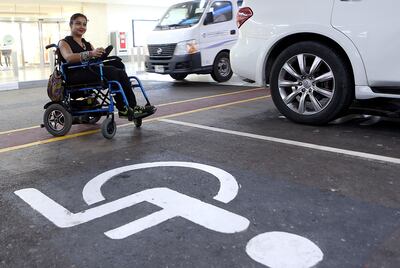It is a grand plan to make Dubai the leading emirate for disabled access by 2020, with businesses, amenities and new construction projects brought into line to make them open to all.
But just a few hours in the company of disability campaigner Shobhika Kalra is enough to see just how much work is needed to make that ambition a reality.
Ms Karla, 27, has been in a wheelchair for 13 years since having a rare degenerative disorder called Friedrich Ataxia, a muscle-wasting condition that damages the central nervous system, diagnosed.
Since moving to Dubai from India, she has established a disabled rights campaign group called Wings of Angelz with her sister, Ruchika.
While metro stations around Dubai have led the way in improving wheelchair access, with access ramps and lifts, work is still needed, as Ms Karla relies on the kindness of others to open the heavy doors to get inside.
It is one of many frustrations she has on her daily commute to work in Karama for her job as a marketer for the Eduscan Group.
“I’ve been in a wheelchair for six years in Dubai and I can see things are changing slowly,” she said.
“There are good access points at most metro stations and since that has opened it has made a huge difference to my life, and others like me, as it has given us our independence.
“It has allowed me to go out and have my own life, and I now have a job.
“I can get to Rashidya Metro Station in about 15 minutes and then go to work from there.”
Wings of Angelz is hosting “ramp day” on Saturday, October 21, to encourage volunteers to help out with identifying areas in need of improvement.
Ms Karla is asking people to meet at the DIFC Metro station at 5pm that day, to join her in identifying businesses with poor access areas, and to request improvements in line with the Dubai Strategy for Disabilities 2020.

“There are some restaurants near where I live that don’t have any disabled toilets, let alone a ramp to access the doors,” she said.
“It has been a good initiative to encourage more businesses to improve disabled access in the workplace, and it has given us the chance to work. That is very important.
“But it is still hard to get around on the pavements, as the kerb is very high and I don’t always know there will be a drop-off at the other end.
“If I am in an area I do not know well, it is safer for me to go on the road, but it can be dangerous.”
Ms Karla often has to run the gauntlet of riding her wheelchair on the road, as some pavements are filled with too many obstacles, such as traffic signs, lampposts or overgrown vegetation.
On one occasion, she was knocked out of her chair when a car didn’t see her on the road. Luckily, she was OK bar a few knocks and bruises but it was a timely reminder of the importance of having good disabled access on pavements and walkways.
A Dh10 million study in Dubai is under way to help steer the emirate towards its goal of becoming one of the world’s most disabled-friendly cities.
Four pilot projects have been chosen in areas around Dubai to improve access, and will be used as models to be replicated across the city by 2020.
The project included uniform standards for ramp size and width, building entrances and in toilets.
By 2020, it is hoped buildings, pavements, road infrastructure, buses, trains and marine and air transport will be more suitable for disabled use.
To sign up to ramp day and help identify areas for improvement, visit the Wings of Angelz Facebook page to register interest as a volunteer.

